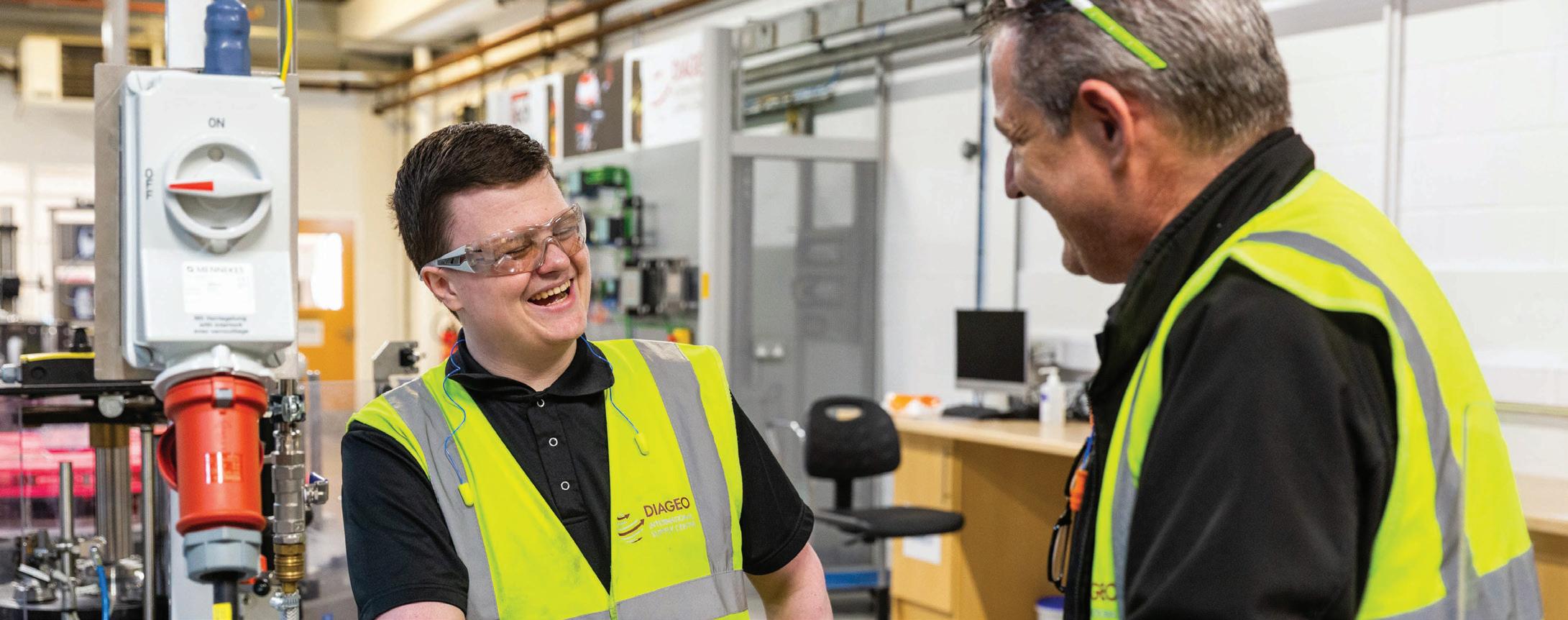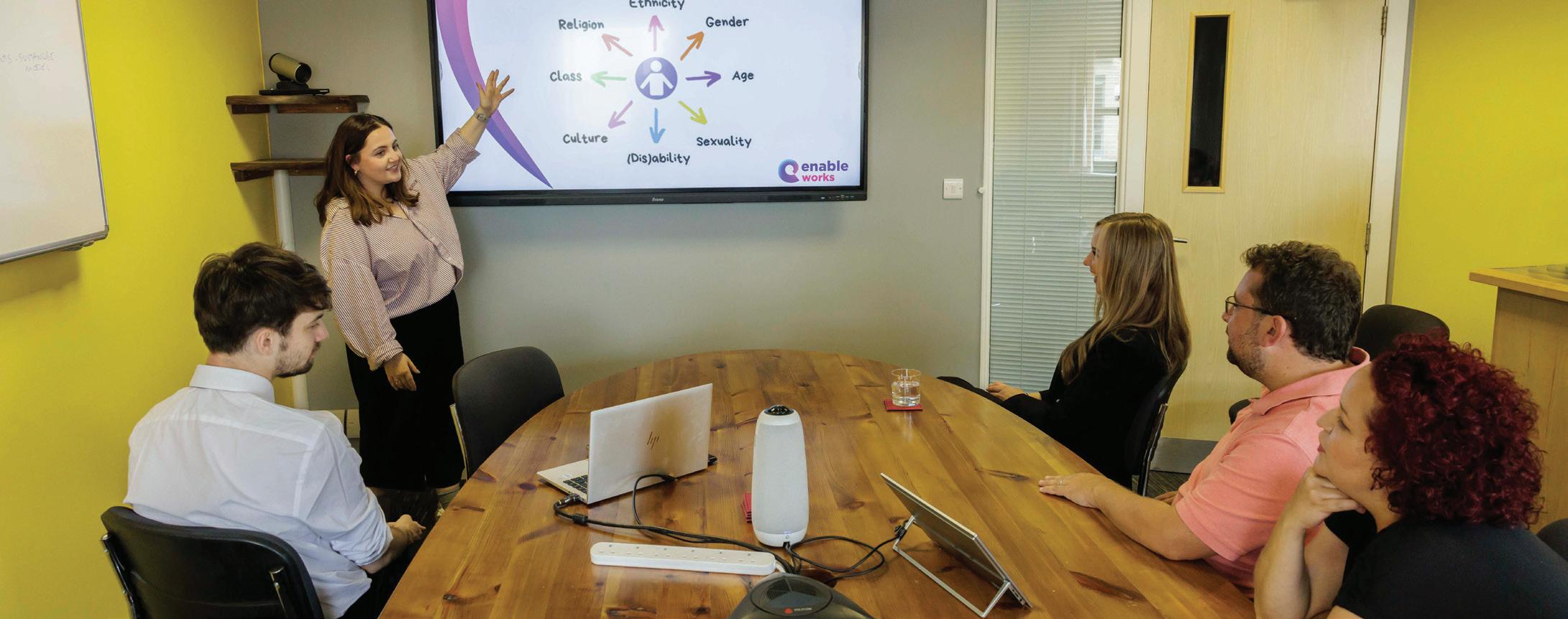Diversity, Equity & Inclusion TRAINING





A diverse and inclusive workplace can help your employees fulfil their potential and contribute fully to your team’s success.
This session will develop your understanding of what diversity and inclusion means. We will explore motivations and perceptions, assessing how bias can affect our decisions and how we can reduce this in a constructive way.
The training also raises awareness of discrimination and considers the benefits of having a more diverse workforce. By exploring concepts of intersectionality and allyship, there is a focus on understanding company culture and how encouraging equality, diversity, equity, and inclusion can benefit your workplace. This session also comes with a support tool on how to overcome unconscious bias and guidance on intersectionality.
• Learn the differences between diversity, equity, equality and inclusion
• Understand importance in the workplace
• Understand what bias is
• Consider own decision making
• Learn benefits of diversity in the workplace
DEI is one of the most important aspects of employment today: it’s not just a fad, a buzzword, or a box-ticking exercise. DEI training shouldn’t just be something that HR or senior managers are put through before it’s forgotten about; I think absolutely everybody should receive this training.
Hannah Roussel, Marketing Officer, CEIS

This training will expand your understanding of different types of disability. It will challenge perceptions, bust myths, and explore how a more inclusive environment can be created.
We will highlight different types of barriers that may be presented to disabled people and how these barriers can be removed. Reflection on our own practices will provide the opportunity to explore what we can do to improve disability inclusion within our workplaces. This session also comes with a support tool on language advice.
• Understand what disability means
• Understand different conditions and how they can affect people
• Look at the social model of disability
• Understand the barriers which disabled people face daily
• Learn how you can provide effective support
This training will enhance your understanding of what a learning disability is and how best to support individuals with learning disabilities.
This training presents an opportunity to explore common misconceptions and consider the impact of attitudes and assumptions. We will also explore learning disability in the workplace, what learningdisabled employees can offer to any organisation, and how reasonable adjustments can remove barriers, so opportunities are fair and accessible.
• Understand what Learning Disability means
• Understand different conditions and how they can affect people
• Understand the social model way of thinking
• Analyse the barriers which people with learning disabilities can face
• Learn how you can provide effective support
Neurodiversity is a term used more commonly now and employers are increasingly understanding the benefits of having diverse talent within their teams.
This training brings a focus to neurodiversity, what this term means and the most common neurodiverse conditions. Taking a closer look at individual neurodiverse conditions will provide the opportunity to identify specific adjustments that could support individuals.
You will have the opportunity to apply learning to your own workplace environment and practices, and consider actions to take forward that will help you create a more inclusive workplace.
Learning Outcomes:
• Learn more about neurodiversity
• Look at neurodivergent conditions
• Understand the social model of disability
• Learn about sensory processing and masking
• Understand how to create inclusive environments
Autism is a spectrum, but not in the way you might think. Every autistic individual will present their characteristics differently.
As understanding and language changes over time, this training explores current definitions and terminology in relation to autism. Areas of difference will be explored, building awareness around sensory processing, masking and shutdowns.
Participation in this training provides an opportunity to explore key support strategies and adjustments that can support autistic individuals in the workplace, providing the opportunity to maximise potential.
Learning Outcomes:
• Learn more about autism
• Understand the characteristics of autism and how to provide support
• Understand the social model
• Learn common misconceptions
• Take away some tips for your own practice
• Know where to go for more advice
Does your organisation have a focus on tech? Would you like to better understand how to access a wider pool of talent?
Autistic individuals can bring a wealth of knowledge and skills to your organisation, but sometimes, unknowingly, barriers exist within the recruitment process which limits access.
This training explores current definitions and terminology in relation to autism. Areas of difference will be considered, building awareness around sensory processing, masking, and shutdowns.
Focusing on the skills and strengths directly related to tech roles, this training allows you to examine support strategies through the recruitment process, and adjustments within the workplace, that can help support autistic individuals within your team. This session also comes with a support tool on dyslexia and tablets.
• Learn more about Autism Spectrum Condition (ASC)
• Understand the characteristics of autism
• Understand the social model
• Understand the potential of diversity in the tech sector
• Learn inclusive recruitment strategies
• Learn strategies to support autistic people in the workplace


To develop your awareness and understanding around visual impairments, this training will provide you with key facts and explanations on different types of visual impairments.
Analysing the barriers people may face within the workplace, you can evaluate your own environment and consider support measures that can be adopted.
There will be opportunity to explore accessible content and assistive technology and how this can be implemented in the workplace to support visually impaired employees and customers.
• Learn about visual impairments and causes
• Learn about different types of barriers and reasonable adjustments
• Learn how to evaluate a document’s accessibility using screen-readers
• Understand how Assistive Technology can help

A digitalised world expands ways of connecting with talent, but brings with it the challenge of attracting a more diverse audience to your organisation.
Attending this training will help you consider your approach to recruitment from attracting diverse applicants through to the onboarding of successful candidates.
This training will build your confidence in creating an inclusive recruitment process for disabled candidates, with practical examples and advice. This session also comes with a support tool on practical inclusive recruitment tips.
• Understand how to attract diverse candidates
• Learn about inclusive candidate selection
• Understand alternative interview processes
• Understand how to make reasonable adjustments at interview and on the job
• Learn how to successfully onboard disabled employees

In looking after your employees’ mental wellbeing, levels of staff engagement will rise along with increased morale, innovation and productivity.
Creating a mentally healthy workplace is therefore not just in the interest of your employees, but also crucial to your organisation as a whole.
As well as considering definitions of mental health, this training will help you develop your understanding of common conditions in the workplace. Discussion will take place around factors that influence mental health and how we can create positive working environments that support a healthy workplace culture. This session also comes with a support tool for the mental health continuum and a wellness action plan tool.
• Increase knowledge of mental health terminology
• Understand common mental health conditions and discuss factors that can influence mental health
• Consider how to promote a mentally healthy workplace
• Understand how to support employees
• Increase awareness of strategies to promote your own mental wellbeing

Flexible work environments accommodate employees, taking into consideration an employee’s needs and obligations outside of work such as caring for family members, pursuing training or education, or managing a disability or long-term health condition.
This training will allow you to explore a range of ways to work flexibly, considering job design that meets both the organisation’s and the individual’s needs.
You will reflect on challenges and concerns, and gain insight into opportunities and strategies for flexible working.
• Understand the benefits of offering flexibility
• Learn a range of ways to work flexibly and consider job design methodology to match flexibility to role requirements
• Learn how to overcome some common challenges of flexible working
• Learn how to recognise opportunities to promoting flexibility
By implementing web accessibility best practices, you improve usability of your website for all, and ensure that people with disabilities have a positive user experience when accessing your site.
This training will provide insight into how to remove barriers that make websites difficult, or even impossible, for some people to use. We will explore the different aspects of a website, and consider how each can be adjusted to become more accessible.
You will leave this training with an improved understanding of the importance of achieving inclusion in this manner, and with the confidence to analyse and review your own website.
• Understand what web accessibility is and its importance
• Understand the core principles of accessibility
• Learn how to make websites more accessible
Technology is continuously advancing. Through rapid development and innovation, new products emerge and current products are seeing vast improvements.
Now more than ever, there are assistive devices enabling people with disabilities to live independent lives and further their careers. This training provides the opportunity to explore what assistive technology is available and how this can support individuals in the workplace.
• Understand what assistive technology is
• Understand the range of products and how often we use them
• Understand the funding process
• Gain the knowledge and confidence to support employees in need of assistive technology.

Employees that feel valued in work will have increased job satisfaction and motivation, ultimately helping your business through increased performance and a healthier, happier workplace culture.
Taking part in the training will increase your understanding of how best to support disabled employees in the workplace and develop your awareness around equality, equity, and discrimination.
Guided discussions around physical workspaces, reasonable adjustments and workplace practices will allow you to reflect on how your organisation can ensure disabled employees are supported long term to allow them to develop and progress in their careers.
• Understand different disabilities
• Understand reasonable adjustments
• Learn lived examples of implementing adjustments
• Know full Equality Act responsibilities
• Consider strategies to retain and develop disabled employees

Early opportunities to experience the world of work is important for any young person and particularly for disabled young people, who may face additional barriers to accessing these opportunities.
This session will allow you to understand how to engage with young people in your community, strengthen your community links and meet potential future candidates.
As well as an overview of different types of disability, this training explores potential barriers and possible adjustments that could be implemented.
You will gain insight into creating an effective work experience programme that is mutually beneficial to the individuals on placement as well as your organisation.
• Understand disability and how young people are affected
• Learn how to create accessible opportunities
• Learn how to plan appropriate work experience programmes
• Learn how to create successful opportunities

Unconscious bias training is a programme designed to help you recognise and overcome your unconscious biases.
These biases are often formed because of socialisation, cultural conditioning, and personal experiences. They can have a profound impact on our behaviour and decision-making, leading to discrimination and inequality in the workplace.
The core objective of this session is to reduce the impact of bias in the workplace. This can include improving hiring and promotion practices, reducing discrimination and harassment, and creating a more inclusive and diverse workplace. Additionally, the session will help you develop skills for recognising and managing your biases, improving your decisionmaking and interpersonal communication.
• Understand what bias is and how it is formed
• Understand the impact of bias in the workplace
• Understand how to challenge your own decision-making
• Learn about the benefits of diversity in the workplace

This session will increase your understanding of deafness and hearing loss, empowering you to support individuals with compassion.
The session explores effective strategies, appropriate terminology, and relevant assistive technology. You will gain insight into deaf culture, fostering inclusivity in your interactions. Through the learning in this workshop, you can create an accessible and understanding environment for all.
• Understanding more about deafness and hearing loss
• Consider strategies to support individuals with Deafness and Hearing loss
• Terminology/Dos and Don’ts
• Consider relevant assistive technology
• Gain a better understanding of deaf culture
As an experienced training provider, we are well used to working with organisations and responding flexibly to the requirements of the business and its staff.
We are committed to ensuring training is delivered via the medium most suited to the learners and we will work with you to identify and accommodate preference as much as possible.
We are committed to creating high quality training that has long term organisational impact. We would always recommend, where possible, in-person training and we are happy to schedule delivery in line with the needs of the business.


Accessibility is crucial when developing training programmes at Enable Works.
We are committed to ensuring that individuals with disabilities, or different abilities, can fully participate and benefit from the content. Accessible training materials enhance the learning experience for everyone, accommodating different learning styles and preferences.
The Enable Works DEI team includes staff who have lived experience of disability and who act as consultant learners throughout the development process, providing advice and guidance throughout the production process to ensure the training is accessible to learners with differing abilities and preferences.
Our skilled DEI Consultants are experienced in developing training and considering different learning styles, which are crucial for creating an inclusive and effective learning experience.
By tailoring training materials to accommodate visual, auditory, and kinaesthetic learners, participants are more engaged, comprehend information better, and retain knowledge for practical application.
We are committed to an approach that acknowledges individual differences, maximizes learning outcomes, and ensures that a diverse range of learners can benefit from the training programme. Ultimately, considering various learning styles promotes inclusivity, enhances comprehension, and increases the overall effectiveness of the training.
www.enable.org.uk/enable-works dei@enable.org.uk